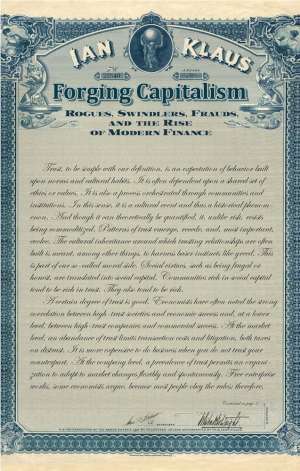24 June 2015
Forging capitalism
Rogues, swindlers and the rise of modern finance
Ian Klaus
2014, Yale University press, 287 pages, £17.09
ISBN 9780300188332
Reviewer: Bill Allen

Economic growth in nineteenth century Britain was extraordinary and unprecedented, especially after the Napoleonic Wars were over. There was massive internal migration (as there is in China today) as people gave up rural poverty in search of better incomes and in the hope of better lives in the cities; as a by-product, political power had to be shared more widely. There was enormous industrial development, and the population grew from 16.3 million in 1801 to 41.6 million in 1901. The nation was transformed.
Needless to say, the process was chaotic. The development of industries was mainly privately financed. This is perhaps most remarkable in the case of the railways, whose development in Britain was largely completed by 1900. Railways were expensive and time-consuming to build, and they yielded no income at all until they were finished and tickets could be sold.
Obviously the functioning of financial markets was crucial. Investors took massive risks, whether they knew it or not. The title of Ian Klaus’s book refers to fraud, and he sometimes creates the misleading impression that fraud was the main feature of 19th century capitalism. If it had been, the transformation of Britain wouldn’t have happened and capitalism would not have survived. Klaus laments the contrast between the orderly community of prudent, sincere, industrious capitalists, concerned above all to preserve their reputations, imagined by Adam Smith, and the parade of cheats and charlatans which he presents to the reader. Not all capitalists were cheats or charlatans, but nevertheless Joseph Schumpeter’s conception of capitalism as a relentless process of ‘creative destruction’ was closer to the 19th century truth than Adam Smith’s. Many other authors have pointed out that there was a lot of fraud in the 19th century - among them, W.T.C. King’s A History of the London Discount Market stands out.
Klaus’s book is mistitled; 19th century capitalism was genuine, not forged, and the book is really about the ways in which the trust that is necessary for commerce was established, and how they developed during the century. Klaus’s method is to recount a series of stories, showing in each case how trust was established and then broken; some of the stories are recounted at rather greater length than is necessary to make the required point. If there is a theme, it the growing importance of verification, for example through the production of audited accounts, as a means of maintaining trust.
Trust is always needed for successful commerce. Yet even now, despite spectacular advances in information technology and enormous resources devoted to verification, fraud still hasn’t been eliminated. Indeed, rank and reputation have enjoyed a renaissance in our celebrity culture. The case of the late Robert Maxwell is perhaps instructive. Maxwell prospered for twenty years after the Department of Trade and Industry declared him unfit to be a company director in 1971, and in continuing his commercial career was able to plunder his employees’ pension fund, thus giving rise to today’s pension regulation. How did he do it? Brass neck is the answer. His personal PR and his cultivation of powerful friends persuaded enough people to ignore or forget the DTI inspectors, and dissuaded others from denouncing him. In a different and darker field, Jimmy Savile is a more recent example of the same phenomenon.
The ‘right to be forgotten’ is a subject of current debate, but if it is a right, it has surely been irretrievably lost, as a result of new information technology. As a consequence, it is now much harder for people with disgraceful or embarrassing pasts to make a fresh start, and redeem themselves. Those who are clever enough not to get caught are a different matter.
Klaus’ book is interesting and thought-provoking on this central and timeless question, though it leads to no particular conclusion.
